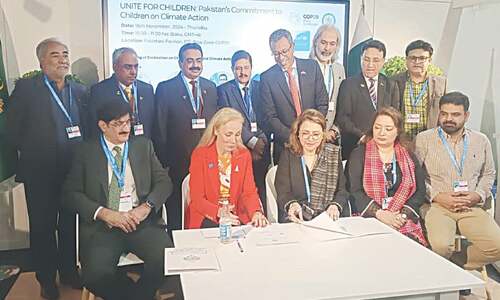• Urges swift resolution of children’s cases
• Slams continued practices of Swara, Wani
ISLAMABAD: Senior puisne judge of the Supreme Court Justice Syed Mansoor Ali Shah has emphasised the need for collective efforts to create a compassionate and just system for children.
He was speaking at the launch event of “Re-imagine Justice for Children in Pakistan — The Voice of Children,” a joint initiative by the Federal Judicial Academy (FJA) and Unicef, on Saturday.
In his insightful discourse on “Domestication of Global Framework on Justice for Children,” Justice Shah highlighted the importance of raising awareness, prioritising rehabilitation over retribution, and dispelling myths.
Sensitising the judges of the district judiciary and other attendees, Justice Shah said: “The best interest of a child should be our prime consideration. We need to be more sensitive about our children, and judges must familiarise themselves with the UNCRC and other international instruments to better reach out to children. Our constitution is also strong and robust in safeguarding child rights. Moreover, there is a lot of wisdom in our religion Islam that protects children.”
Justice Shah referred to Justice Jamal Khan Mandokhail, who was also present at the event, and emphasised the need to interpret Article 11, which deals with children.
“I cannot interpret it now, but you can, since you are in the Constitutional Bench,” Justice Shah said, adding that he was sorry to keep repeating this, but felt compelled to do so. “I can’t interpret this.”
Justice Shah also emphasised the importance of establishing child courts across the country, stating that child justice should be a significant priority. “Children are not just our future; they are our present as well, and therefore, we need to take stock of things right now.”
The judge emphasised the importance of listening to children, something that is often neglected. “We should be listening to children, which we usually don’t interact with,” he said.
He stressed that whenever a child appears in court, judges should talk to them, listen to them, and allow them to participate in court proceedings. He regretted that this was not the norm.
He also called for reintegrating children into society, stating that it was critical. “You cannot treat children like ordinary adults,” Justice Shah said.
He recalled how the first child court was established separately in Lahore, outside the court premises. The concept behind this was to prevent children from passing through the ordinary judicial system, as they were in their formative years.
The judge emphasised that cases involving children should be decided as quickly as possible so that the children could return to their normal lives, instead of being delayed along with other cases.
He clarified that it was not necessary for a child to be involved in a criminal case; they could also be a witness, respondent, defendant, or even an accused in a case. “The purpose is that their case should be decided as early as possible,” he said, adding that the concept behind children’s courts emphasises a restorative approach over punitive measures, aiming to create opportunities for children to lead fulfilling lives.
Citing figures from Unicef’s statistics, Justice Shah noted that there are 2.4 billion children in the world, nearly a third of the total female population. He highlighted global challenges, including children in conflict zones, stating that over 450 million children live in conflict-affected areas where justice is often inaccessible.
“It is very depressing to talk about genocide in Gaza, and the figures coming out are very disturbing,” he said.
He also pointed out the challenges of child labour and global exploitation, as well as issues within the juvenile justice system. “Incarceration rates remain alarmingly high, while the rehabilitation system is often punitive rather than restorative. This is a global dilemma,” he added.
Justice Shah also drew attention to digital vulnerabilities as a new and growing concern. “Online exploitation, cyberbullying, and trafficking are emerging threats to children’s safety,” he lamented.
Referring to Pakistan, Justice Shah noted that as of 2023, there were 107m people under the age of 18 in the country. Of these, 71m children were aged between five and 16. “This is a unique situation where Pakistan has a younger generation than any other country, as 62 per cent of its population comprises young people. We need to be overly alert so that we can ably channelise this energy.”
Justice Shah emphasised that child health should be a top priority.
Referring to a survey by the Bureau of Statistics taken by Nadra, Justice Shah said that 0.4m children in Pakistan had special needs. He also cited the continued practice of Swara and Wani, where young girls are given in marriage to aggrieved families as compensation to resolve disputes. “We should be ashamed of this,” he regretted.
He highlighted that around 12.5m children between the ages of five and 14 are engaged in child labour. He pointed out the issue of child trafficking, with 33,000 victims, forced conversions, and corporal punishment by teachers in schools, which, though illegal, continues unabated.
Other societal issues affecting children, such as juvenile offenders and child abuse, were also raised. He added that with the increase in internet users in Pakistan, child pornography, cyberbullying, live streaming of child abuse, and ‘sexting’ have all intensified.
“We as judges need to prioritise the best interests of the child, realising what actions will truly benefit them,” Justice Shah said. “Judges should also guarantee equal and fair treatment for every child, free from all kinds of discrimination. It is the responsibility of the court to protect the child from exploitation, violence, and abuse,” he said.
Published in Dawn, December 8th, 2024












































